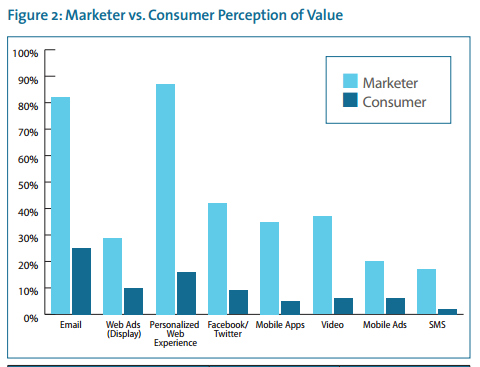Thanks to advanced web technology and big data, brands have more information than ever about their customers and prospects. Ideally, this would make marketers more effective at creating digital content that’s honed into target audiences’ needs and desires. But most brands are off the mark, according to a recent X+1 study. Survey data shows marketers think their campaigns are working well across platforms, but customers disagree. It’s clear these perspectives need to come into alignment, or brands could be funneling budgets toward ineffective practices.
More than 80 percent of marketers think personalized email marketing campaigns are driving value. One-quarter of customers agree. The disparity was even worse for customized web content. Nearly 90 percent of marketers think they are successful in creating personalized web experiences for internet users, but less than 20 percent of consumers agree.

These findings suggest many companies are creating targeted content and assuming it positively influences lead engagement, but they may actually be blinded by their optimistic expectations. Just because marketers have the ability to tailor web experiences doesn’t necessarily mean they’re doing it well. Custom content isn’t something businesses can set and forget: It must be constantly refined based on the feedback they receive through social listening, comments and conversion data in metrics reports.
There’s also the chance marketers’ content analytics skills are to blame for this discrepancy. Brafton recently covered a report that found 37 percent of marketers still lack skills in the analytics department and the C-suite knows it. The Online Marketing Institute’s State of Digital Talent survey revealed more than three-quarters of employers are actively seeking fresh talent or training to bring these crucial skills up to par.
To truly harness the potential of personalization and capitalize on potential results, marketers must be prepared to roll up their sleeves. Data can prepare brands to craft smarter strategies, but it doesn’t guarantee success. It’s up to marketers to make sense of the information and dig deeper than surface-level insights to learn what their customers really want, what they enjoy and what inspires them to convert.





